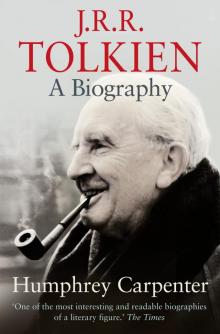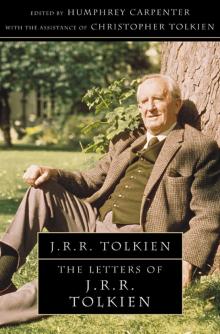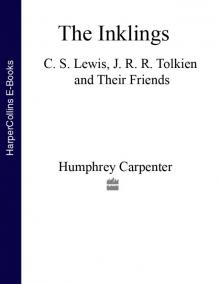- Home
- Humphrey Carpenter
The Inklings Page 6
The Inklings Read online
Page 6
shaken off
The heavy weight of many a weary day
Not mine, and such as were not made for me.
But so far from grousing, I am deeply, and I hope devoutly thankful.
It has been a good bargain: how many men are there, who, before they are forty, can struggle free, and begin the business of living?
In 1930 the Lewis-Moore ménage moved to the Kilns, a house at the foot of Shotover Hill not far outside Oxford city and on the edge of the village of Headington Quarry. The house was named after the brick kilns that stood nearby; the garden was the size of a small park, with eight acres of land rising steeply up a wooded hillside, and broken by a lake which could be used for bathing and even punting. Chiefly thanks to funds from the sale of the Belfast house, the Lewis brothers and Mrs Moore were able to raise the sum asked for the property, and it became their home late in 1930. After settling in with Jack and ‘Minto’, Warnie took stock of his new life, of the house in its idyllic setting, of the undeniable domestic tensions, and also of the pleasant daily routine that he envisaged. ‘I reviewed the pros and cons’, he wrote in his diary, ‘and came to the conclusion that on balance, I prefer the Kilns at its worst to army life at its best: the only doubtful part being “Have I seen the Kilns at its worst?”’
*
By the beginning of September 1931 eleven years had passed since Jack Lewis had stopped being a dogmatic atheist.
As long ago as 1920 his study of philosophy had led him ‘to postulate some sort of God as the least objectionable theory’, though he added, ‘of course we know nothing’. The notion of an ultimate truth made sense to him because, as he remarked in 1924 when commenting on Bertrand Russell’s free-thinking idealism, ‘our ideas are after all a natural product’, and there must be some objective standard, some ultimate fact to explain them. On the other hand ‘God’ still seemed a crude and nursery-like word, and for several years Lewis used other terms to describe his notion of fundamental truth. During this time he was, like most of those who studied philosophy at Oxford in the early nineteen-twenties, still accepting the work of Hegel and his disciples, and as a result he chose Hegelian expressions such as ‘the Absolute Mind’ or just ‘the Absolute’.
But when he spent the year 1924–5 teaching Philosophy at University College he discovered that this ‘watered Hegelianism’ was inadequate for tutorial purposes. The notion of an unspecified Absolute simply could not be made clear to his pupils. So he resorted to referring to fundamental truth as ‘the Spirit’, distinguishing this (though not really explaining how) from ‘the God of popular religion’, and emphasising that there was no possibility of being in a personal relationship with this Spirit. Meanwhile he adopted a benevolent but condescending attitude to Christianity, which he said was a myth conveying as much of the truth as simple minds could grasp.
This was all very well, but among those ‘simple minds’ were men whose thinking he profoundly admired in other respects: Malory, Spenser, Milton, Donne and Herbert, Johnson, and the author whose romance Phantastes he had discovered in adolescence, George MacDonald. It was annoying to love the writings of these men without being able to accept the central premise of their thought, Christianity. Moreover, many of his friends were Christians. Tolkien was a Catholic, and Greeves and Coghill were Anglicans, while Barfield, though an Anthroposophist, accepted the principal ideas of Christianity. So, in the company of those whom he most liked, Lewis was the outsider.
His ideas changed again when, as a result of their ‘Great War’, Barfield managed to persuade him to accept the experience of ‘Joy’ as relevant to his thinking, and not to dismiss it as merely subjective emotional sensation. ‘Joy was not a deception,’ he now decided. ‘Its visitations were rather the moments of clearest consciousness we had.’
He was going through this stage during 1926 and 1927, and the admission of something as irrational as Joy into his ruthlessly logical thinking threw him into confusion. ‘All my ideas are in a crumbling state at present,’ he wrote in his diary in May 1926. He realised that he had let his rational side dominate his emotions too long, remarking in the diary, ‘One needn’t be asking questions and giving judgments all the time.’ But while this realisation was refreshing, he recorded (in January 1927) that he was frightened of what he called ‘the danger of falling back into the most childish superstitions’, by which he presumably meant belief in God and Christianity. He still had immense resistance to the idea of returning to anything so nursery-like.
Three weeks after this he stopped keeping a diary and never resumed, declaring that it was a foolish waste of time. It was also perhaps because he was unwilling to make public (he often read his diary to Mrs Moore and showed it to Warnie, so it was really a public document) the sensations of the supernatural which he was now experiencing; for he had begun to feel that it was not he himself who was taking the initiative but something outside him. As he expressed it to Owen Barfield, the ‘Spirit’ was ‘showing an alarming tendency to become much more personal and is taking the offensive’. One day while going up Headington Hill on a bus he ‘became aware that I was holding something at bay, or shutting something out’. There was a choice to open the door or keep it shut. Next moment he found that he had chosen to open it. From this, which happened in 1927 or 1928, it was only a matter of time before he ‘admitted that God was God’, a step that he finally took in the summer of 1929. It was then that he ‘gave in and knelt and prayed’. But even so he had done no more than accept Theism, a simple belief in God. He was not able to perceive the relevance of Christ’s death and resurrection, and he told a friend, Jenkin: ‘My outlook is now definitely religious. It is not precisely Christianity, though it may turn out that way in the end.’
*
Apart from the last stage, when he had admitted some kind of supernatural experience, Lewis had reached this position entirely through logical argument. Even his acceptance of ‘Joy’ as a factor had only been conceded after elaborate reasoning by Barfield. But now he began to realise that reasoning would not take him any further. The acceptance of God did not lead him automatically to the acceptance of Christianity. He was becoming certain that he wanted to accept it: he examined other religions, but found none that was acceptable; meanwhile his present state of simple Theism was inadequate. On the other hand he did not know how he could argue himself into specifically Christian beliefs. Even if he were to accept the historicity of the Christian story – and he could see no particular barrier to it – he could not understand how the death and resurrection of Christ were relevant to humanity.
*
By the time that Lewis had come to believe in God (but not yet in Christ), Owen Barfield had done something for him that would later bear fruit. He had shown Lewis that Myth has a central place in the whole of language and literature.
Barfield’s arguments were printed in Poetic Diction, a short book by him that appeared in 1928 – though by that time Lewis knew its ideas well. Barfield examined the history of words, and came to the conclusion that mythology, far from being (as the philologist Max Müller called it) ‘a disease of language’, is closely associated with the very origin of all speech and literature. In the dawn of language, said Barfield, speakers did not make a distinction between the ‘literal’ and the ‘metaphorical’, but used words in what might be called a ‘mythological’ manner. For example, nowadays when we translate the Latin spiritus we have to render it either as ‘spirit’ or as ‘breath’ or as ‘wind’ depending on the context. But early users of language would not have made any such distinction between these meanings. To them a word like spiritus meant something like ‘spirit-breath-wind’. When the wind blew, it was not merely ‘like’ someone breathing: it was the breath of a god. And when an early speaker talked about his soul as spiritus he did not merely mean that it was ‘like’ a breath: it was to him just that, the breath of life. Mythological stories were simply the same thing in narrative form. In a world where every word carried some implication of the ani
mate, and where nothing could be purely ‘abstract’ or ‘literal’, it was natural to tell tales about the gods who ruled the elements and walked the earth.
This, in greatly simplified form, is what Barfield argued in Poetic Diction. He was not the only person to come to this conclusion: for example in Germany, Ernst Cassirer had said much the same thing independently. But it was said with particular force by Barfield, and his book impressed not just Lewis but also Tolkien. Not long after the book’s publication, Lewis reported to Barfield: ‘You might like to know that when Tolkien dined with me the other night he said à propos of something quite different that your conception of the ancient semantic unity had modified his whole outlook and that he was always just going to say something in a lecture when your conception stopped him in time. “It is one of those things,” he said “that when you’ve once seen it there are all sorts of things you can never say again.”’ Perhaps it was as a result of reading Barfield’s book that Tolkien made an inversion of Muller’s remark. ‘Languages’, he declared, ‘are a disease of mythology.’
So it was that by 1931 Lewis had come to understand that mythology has an important position in the history of thinking. It was a realisation that helped him across his last philosophical hurdle.
*
On Saturday 19 September 1931 Lewis invited two friends to dine with him in Magdalen. One was Tolkien. The other was Hugo Dyson.
Henry Victor Dyson Dyson, always known as ‘Hugo’, lectured in English Literature at Reading University. He was a couple of years older than Lewis. He had been severely wounded in the First World War, had read English at Oxford, and was a practising member of the Church of England. He was also exuberant and witty. Lewis had been introduced to him in July 1930 by Nevill Coghill, and ‘liked him so much that I determined to get to know him better’. On further acquaintance he found Dyson to be ‘a man who really loves truth: a philosopher and a religious man; who makes his critical and literary activities depend on the former – none of your dammed dilettanti’.
On this Saturday night in 1931, after they had dined, Lewis took his guests on a walk through the Magdalen grounds. They strolled along Addison’s Walk (the path which runs beside several streams of the River Cherwell) and here they began to discuss metaphor and myth.
Lewis had never underestimated the power of myth. Far from it, for one of his earliest loves had been the Norse myth of the dying god Balder. Now, Barfield had shown him the crucial role that mythology had played in the history of language and literature. But he still did not believe in the myths that delighted him. Beautiful and moving though such stories might be, they were (he said) ultimately untrue. As he expressed it to Tolkien, myths are ‘lies and therefore worthless, even though breathed through silver’.
No, said Tolkien. They are not lies.
Just then (Lewis afterwards recalled) there was ‘a rush of wind which came so suddenly on the still, warm evening and sent so many leaves pattering down that we thought it was raining. We held our breath.’
When Tolkien resumed, he took his argument from the very thing that they were watching.
You look at trees, he said, and call them ‘trees’, and probably you do not think twice about the word. You call a star a ‘star’, and think nothing more of it. But you must remember that these words, ‘tree’, ‘star’, were (in their original forms) names given to these objects by people with very different views from yours. To you, a tree is simply a vegetable organism, and a star simply a ball of inanimate matter moving along a mathematical course. But the first men to talk of ‘trees’ and ‘stars’ saw things very differently. To them, the world was alive with mythological beings. They saw the stars as living silver, bursting into flame in answer to the eternal music. They saw the sky as a jewelled tent, and the earth as the womb whence all living things have come. To them, the whole of creation was ‘myth-woven and elf-patterned’.
This was not a new notion to Lewis, for Tolkien was, in his own manner, expressing what Barfield had said in Poetic Diction. Nor, said Lewis, did it effectively answer his point that myths are lies.
But, replied Tolkien, man is not ultimately a liar. He may pervert his thoughts into lies, but he comes from God, and it is from God that he draws his ultimate ideals. Lewis agreed: he had, indeed, accepted something like this notion for many years. Therefore, Tolkien continued, not merely the abstract thoughts of man but also his imaginative inventions must originate with God, and must in consequence reflect something of eternal truth. In making a myth, in practising ‘mythopoeia’ and peopling the world with elves and dragons and goblins, a storyteller, or ‘sub-creator’ as Tolkien liked to call such a person,1 is actually fulfilling God’s purpose, and reflecting a splintered fragment of the true light. Pagan myths are therefore never just ‘lies’: there is always something of the truth in them.
They talked on, until Lewis was convinced by the force of Tolkien’s argument. But he had another question to put to his friends, and as it was late they decided to go indoors to Lewis’s rooms on Staircase III of New Buildings. There, he recorded, ‘we continued on Christianity’.
*
Lewis had a particular reason for holding back from Christianity. He did not think it was necessarily untrue: indeed he had examined the historicity of the Gospels, and had come to the conclusion that he was ‘nearly certain that it really happened’. What was still preventing him from becoming a Christian was the fact that he found it irrelevant.
As he himself put it, he could not see ‘how the life and death of Someone Else (whoever he was) two thousand years ago could help us here and now – except in so far as his example could help us’. And he knew that Christ’s example as a man and a teacher was not the centre of the Christian story. ‘Right in the centre,’ he said, ‘in the Gospels and in St Paul, you keep on getting something quite different and very mysterious, expressed in those phrases I have so often ridiculed – “propitiation” – “sacrifice” – “the blood of the Lamb”.’ He had ridiculed them because they seemed not only silly and shocking but meaningless. What was the point of it all? How could the death and resurrection of Christ have ‘saved the world’?
Tolkien answered him immediately. Indeed, he said, the solution was actually a development of what he had been saying earlier. Had he not shown how pagan myths were, in fact, God expressing himself through the minds of poets, and using the images of their ‘mythopoeia’ to express fragments of his eternal truth? Well then, Christianity (he said) is exactly the same thing – with the enormous difference that the poet who invented it was God Himself, and the images He used were real men and actual history.
Do you mean, asked Lewis, that the death and resurrection of Christ is the old ‘dying god’ story all over again?
Yes, Tolkien answered, except that here is a real Dying God, with a precise location in history and definite historical consequences. The old myth has become a fact. But it still retains the character of a myth. So that in asking what it ‘meant’, Lewis was really being rather absurd. Did he ask what the story of Balder or Adonis or any of the other dying gods in pagan myth ‘meant’? No, of course not. He enjoyed these stories, ‘tasted’ them, and got something from them that he could not get from abstract argument. Could he not transfer that attitude, that appreciation of story, to the life and death of Christ? Could he not treat it as a story, be fully aware that he could draw nourishment from it which he could never find in a list of abstract truths? Could he not realise that it is a myth, and make himself receptive to it? For, Tolkien said, if God is mythopoeic, man must become mythopathtic.
*
It was now 3 a.m., and Tolkien had to go home. Lewis and Dyson came downstairs with him. They crossed the quadrangle and let him out by the little postern gate on Magdalen Bridge. Then, Lewis recorded, ‘Dyson and I found more to say to one another, strolling up and down the cloister of New Building, so that we did not get to bed till 4.’
Twelve days later Lewis wrote to Arthur Greeves: ‘I have just passed on f
rom believing in God to definitely believing in Christ – in Christianity. I will try to explain this another time. My long night talk with Dyson and Tolkien had a good deal to do with it.’
4
‘The sort of thing a man might say’
Actually it was not quite so easy or so sudden as that. Arthur Greeves wrote to Lewis saying he was delighted that his friend had at last accepted Christianity. After reading this letter from Greeves, Lewis began to feel that ‘perhaps I had said too much’. He told Greeves cautiously: ‘Perhaps I was not nearly as clear on the subject as I had led you to think. But I certainly have moved a bit, even if it turns out to be a less bit than I thought.’
He had in fact reached the point where rational argument failed, and it became a matter of belief rather than of logical proof. Tolkien and Dyson’s argument about Christianity as ‘a true myth which is nevertheless a myth’ had a lot of imaginative force, but it was a questionable proposition in terms of strict logic.
Lewis could not go on thinking it over for ever. He realised that some sort of ‘leap of faith’ was necessary to get him over the final hurdle. ‘There must’, he said, ‘perhaps always be just enough lack of demonstrative certainty to make free choice possible, for what could we do but accept if the faith were like the multiplication table?’
So he became a Christian. He made his Communion for the first time since childhood days on Christmas Day 1931, in his parish church at Headington Quarry. But he did not forget to maintain in his mind the distinction between the two questions: the existence of God, which he believed he could prove by logical argument, and the truth of Christianity, which he realised was not subject to rational proof. Indeed his doubts about the Christian story never entirely ceased. There were, he remarked, many moments at which he felt ‘How could I – I of all people – ever have come to believe this cock and bull story?’ But this, he felt, was better than the error of taking it all for granted. Nor was he utterly alarmed at the notion that Christianity might after all be untrue. ‘Even assuming (which I most constantly deny)’, he said, ‘that the doctrines of historic Christianity are merely mythical, it is the myth which is the vital and nourishing element in the whole concern.1

 J. R. R. Tolkien
J. R. R. Tolkien Mr Majeika and the School Caretaker
Mr Majeika and the School Caretaker Mr Majeika Joins the Circus
Mr Majeika Joins the Circus Mr Majeika on the Internet
Mr Majeika on the Internet Mr Majeika and the Ghost Train
Mr Majeika and the Ghost Train Mr Majeika and the Lost Spell Book
Mr Majeika and the Lost Spell Book Mr Majeika and the School Book Week
Mr Majeika and the School Book Week The Letters of J.R.R. Tolkien
The Letters of J.R.R. Tolkien Mr Majeika and the School Inspector
Mr Majeika and the School Inspector Mr Majeika and the Music Teacher
Mr Majeika and the Music Teacher The Inklings
The Inklings Mr Majeika and the School Trip
Mr Majeika and the School Trip Mr Majeika and the Dinner Lady
Mr Majeika and the Dinner Lady Mr Majeika and the School Play
Mr Majeika and the School Play